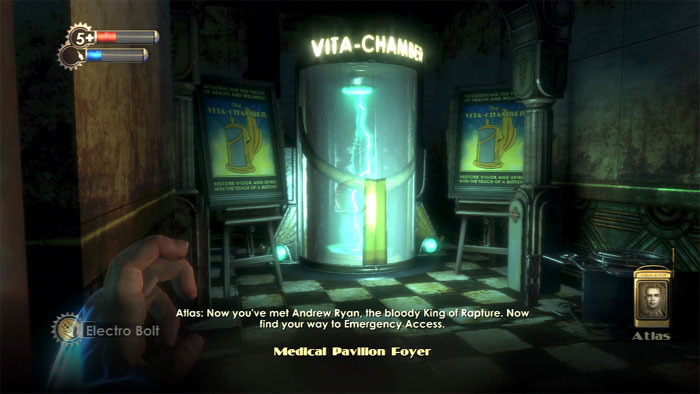
Ever since games began attempting to transition to a medium that conveys stories, a large problem at the core of achieving authenticity is the problem of "ludonarrative dissonance". What is ludonarrative dissonance, you ask?
As per Wikipedia:
"Ludonarrative dissonance refers to conflicts between a video game's narrative and its game play. The term was coined by Clint Hocking, a former creative director at LucasArts (then at Ubisoft), on his blog in October, 2007.[2] Hocking coined the term in response to the game Bioshock, which promotes the theme of self-interest through its gameplay while promoting the opposing theme of selflessness through its narrative, creating a violation of aesthetic distance that often pulls the player out of the game."
Let's examine that, using Bioshock as the first example, since that's what as used in the explanation above. In the original Bioshock, you play as a nobody named Jack, who is placed in a city of bloodthirsty psychopaths. The self-interest is promoted due to the need of survival against those who are in constant opposition of you, so you kill everything that's come your way. However, Bioshock is also known to exemplify and analyze author Ayn Rand's famous "Obejectivist" views which promote selfless individualism for constant progression. These two ideas, one gameplay, one narrative, almost contradict each other when put in to use.

Other, smaller flaws in video games can cause this kind of dissonance. In shooters, often times you can shoot your AI team mates and they won't die, so it pulls you out of the game. Despite your own deaths as a player, you just "respawn" and continue as normal. Of course, these can often be considered what makes a game "game-y". It has to overlook shortcomings in narrative logic in order to allow the player to be a part of it in the most accessible way possible.
Recently though, certain games have been approaching workarounds and explanations in an effort to combat this problem. Bioshock Infinite had a very interesting way of overcoming ludonarrative dissonance, although it may be spoiler-y so I won't detail it. Spec Ops: The Line is all about having the player accept the game's rules, and then knowingly shove it in their face when it causes the player to make difficult and uncomfortable decisions. But at the most, these are workarounds, not solutions.
And perhaps, we might not find a solution. Games have a fundamental way of functioning that, admittedly, does not transfer well when trying to evolve into a more mature and familiar form of expression and "art".

Games like Uncharted and Tomb Raider are clear perpetrators. The new Tomb Raider is especially at fault. Scenario after scenario, Lara Croft gets it handed to her, whether being impaled by a spike, shot in the shoulder, fallen down a mountain and out of a helicopter, she's able to get right back up again. Nathan Drake is hard to be viewed as a likable character when he kills hundreds of people over the course of his games. On top of which, both are flawless killers, able to lay waste to any person in their way, until the narrative decides to throw in a curveball.
It just doesn't work, and it's precisely why I had a hard time enjoying those games. On the mechanic side, games of these types - often, the AAA-level productions that want to give a story - are solid. They are playable, often without glitches, and the gameplay concept is normally pretty good. And yet, the "experience", as it's called, gets pulled down by the narrative trying to be something that it fundamentally can not be.

(So character progression means full executions of enemies?)
Most triple-A games are caught in this identity crisis, and at its core is ludonarrative disonnance making each new production fall short of selling the deal. All signs point towards these mega-devs wanting to create cinematic experiences, similar to a movie. But we are either too early in technological capabilities to achieve these kinds of true movie experiences, or games just can not function in the way they’ve been trying to.
I'm perfectly fine with games that realize that what they are is just that - a game. Also, it's not as if a narrative doesn't work, when the concept fits along with the core mechanics of a video game. Superhero stories, fantasies, and just about anything that's not trying to be grounded in reality and serious material.
Those situations work, and it's possible to create "immersive experiences" through sound, graphics, and engaging ideas. Story doesn't have to be the first priority, and it doesn't need to be what you base a game around. As gamers always like to say, "the gameplay comes first".
~ GoldvsSilver